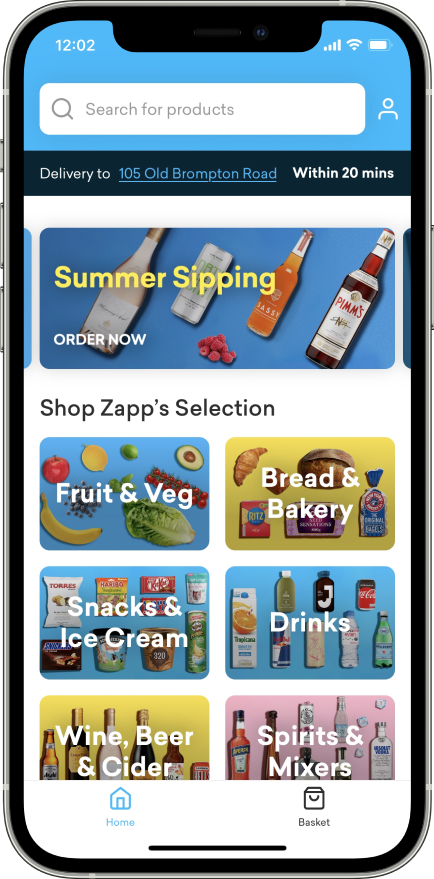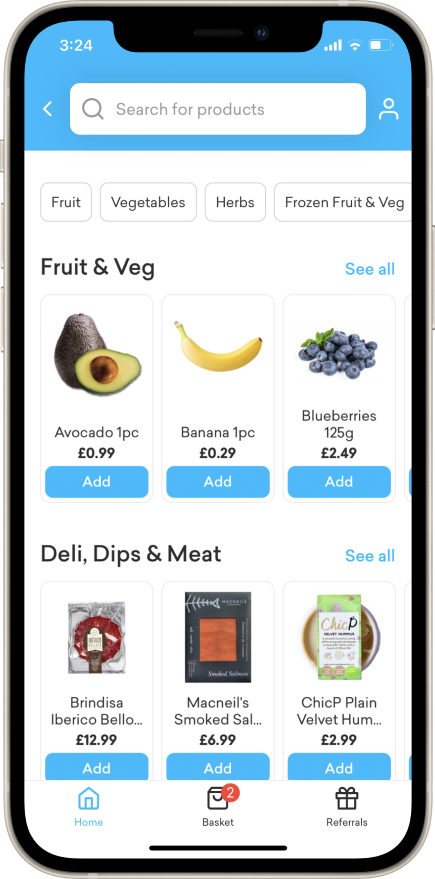
- Products
- Solutions
- Learn
- Partner
- Try Now
Zapp is a speedy grocery delivery company and it belongs to the new generation of apps that are vying for a piece of a British audience. Let’s discuss the Zapp business model in detail.
Zapp was started by Navid Hadzaad and Joe Falter in London in 2020. The company offers to bring your groceries to your doorsteps along with some other crucial things. The service is available 24 hours daily and they can deliver within 20 minutes seven days a week. The company also delivers impulse purchases together with urgently needed essential items such as beverages, snacks, basic foods, health and hygiene products, and OTC pharmaceuticals.

Zapp is keeping and fostering its very own dark stores in some plush areas of London such as Fulham, Notting Hill, Hammersmith, and Chelsea. These stores exist solely to complete online orders.
About Zapp dark stores
The Zapp business model uses dark stores. This separates it from other kinds of e-commerce and hybrid business models. A dark store essentially is a brick-and-mortar store. In most cases, it is a shutdown establishment that is converted into an operations center. These dark stores are not open to visitors as they need more storage space for quick and accurate order fulfillment. The dark sores provide opportunities and resources to the shoppers such as same-day delivery, online shopping, and pickup.
Other perpetrators
Of course, the concept of using dark stores is not new. Many companies have implemented different versions of the process such as Walmart, Whole Foods, Bed Bath & Beyond, Target, and some major fashion retailers. But the number of dark stores used by these companies has risen significantly in the past year. This is due to the advent of the pandemic. As the brick and mortar stores struggled with the situation during the quarantine, the dark stores came into their own.

20-minute delivery
As we are all aware, Zapp can take an order and get it delivered within 20 minutes. Or even in less time in many cases. They can do this 7 days a week and 24 hours a day. For making this possible they have developed their versions of dark stores called Zappstores. All these stores have thousands of items that are ready to pack, ship, and be picked up.
The Zapp business model also needs to hire riders to make these everyday deliveries possible. Although Zapp was just recently launched it caters to almost the whole of London. Customers use the services for last-minute entertainment, sun-deck ice cream, break-time drinks, or for enjoying movies with their children. They opine that Zapp can be a lifesaver when there is some key ingredient missing from your cooking. Or even when available diapers have run out at 2 AM.
How Zapp works
You can download the Zapp app, select the items you need, and place an order. These items are delivered in 20 minutes and there is no requirement for having minimum order. There is a flat delivery fee charged for each order. For orders in the excess of 30 pounds, the delivery fee is waived.
The Zapp business model employs a completely electrical fleet. All Zapp scooters are a mixture of e-mopeds and e-bikes.
Want to read more about e-bikes, mopeds, and scooters? Check out Jugnoo.io’s micromobility solution.
Their products are delivered by using recyclable paper bags. The startup also partnered with Planetly recently, for reducing its carbon footprint, and to contribute towards carbon offsetting projects.
Benefits of using the Zapp business model
1. Quick delivery solution: The dark stores used in the Zapp business model provide a quick and convenient delivery alternative. It allows the capability of selling items contactless in the stores. There is no need for the shoppers to spend time finding parking spaces, rummaging through the store to look for the items they need.
They can also skip the waiting in long queues at the checkouts. The fulfillment centers not only offer quick shipping for the local clients, but they also provide this cheaper shipping to all their clientele. All this is while keeping the costing at a lower ebb with the use of physical retail space.
2. Efficient collection: The warehouses used by Zapp simplify the collection and packaging processes. This is achieved by storing a big inventory in a small space instead of using large warehouses. These dark stores are primarily developed for the fulfillment of orders. Therefore, you may optimize the available space to make things easier for the sellers for their collection. It permits you to pick and track the inventory quickly and more accurately.
3. More alternatives for the customers: Due to the advent of the pandemic, shoppers tried several alternatives for taking orders online. Some of them include roadside pickup, local delivery, and quick and cheap delivery. This is true, especially for groceries and personal care items.
These dark stores prove a convenience to the shopper allowing them simple and same-day pickup of their orders. Due to all the advantages, the shipping alternatives will continue to remain active in the years to come. Even after the coronavirus pandemic.
Zapp snaps up $200 million
The instant grocery delivery start-up has also picked up huge funding recently. They have received a go-ahead from GoPuff, Getir, Deliveroo, and Jiffy. There are many other players interested in sharing the profits of the on-demand convenience market. Zapp raised $200 million in funding recently. This finding is going to be used for increasing its presence in the home market.
The funding will also be utilized for beefing up the presence of Zapp in other megacities. Zapp is active in Cambridge, Amsterdam, Bristol, Rotterdam, and Manchester at the moment apart from London.

The current funding round has been led by Lightspeed, Broadlight Capital, and 468 Capital. Other prior backers are also participating in the funding together with Lewis Hamilton. Zapp at the moment is not disclosing its valuation. It doesn’t talk about the number of customers they served or the orders they have processed to date.
But in total, they have raised in the excess of $300 million in funding for their future endeavors. However, there is strong competition among established players and start-ups in the convenience market.
Dark store order fulfillment
Order fulfillment by using dark stores is a lucrative alternative for several retailers. But here are the three most common alternatives.
1. Curbside pickup: This is a strategically designed parking area where the associates of the retail store place order. There is no need for a customer to get out of his or her car. This kind of service provides a high-security level for the clients, especially in the pandemic-affected areas. It is also a convenient method for shopping. This fact was appreciated by several clients last year.
2. Pickup from the store: Another conventional version used by the dark store model is having a dedicated pickup area within the store. This area normally is close to the main entrance. It means the shoppers do not have to walk around the store for picking up the items they need. This is a useful alternative for the buyers and there is no shipping cost involved.
3. Home delivery: The on-demand products delivery market has skyrocketed in the last year. These dark stores are minting money due to this boom. This is the main reason why Zapp decided to opt for using this model for their business. The on-demand grocery delivery offered by Zapp is convenient, quick, and contactless. This is a perfect situation for groceries and other necessities.
Conclusion
Zapp is developing the future of convenience and this future is going to be sustainable. The delivery fleet they have is all-electric and this was the case from day one. They use just sustainable material for their delivery packaging. They are committed to finding more ways of reducing emissions as they scale their business. Zapp is backed by some of the top investors in the world. Some of them include Lightspeed from Silicon Valley and Atomico from Europe.
If you are looking to power your on-demand grocery delivery business with the right software, look no further than the Jungleworks suite. You can set up a hyperlocal and no-code delivery stack for managing your on-demand business with ease, book a demo with our business experts today.
Subscribe to stay ahead with the latest updates and entrepreneurial insights!

Subscribe to our newsletter
Get access to the latest industry & product insights.





















